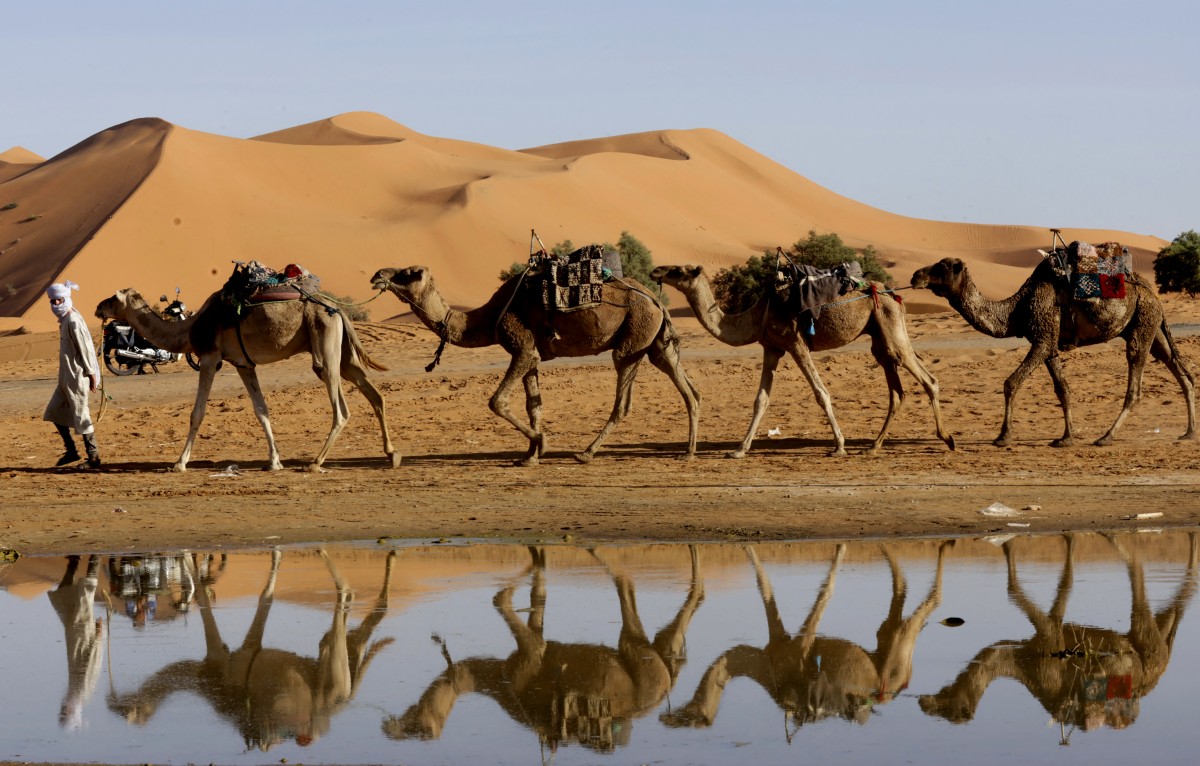Rare Sahara floods bring Morocco’s dried-up south back to life

A man leads his camels along the shores of Yasmina lake, a seasonal lake in the village of Merzouga in the Sahara desert in southeastern Morocco on October 20, 2024. Agence France-Presse
MERZOUGA, Morocco — In Morocco’s southeastern desert, a rare downpour has brought lakes and ponds back to life, with locals — and tourists — hailing it as a gift from the heavens.
In Merzouga, an attractive tourist town some 600 kilometers (370 miles) southeast of the capital Rabat, the once-parched golden dunes are now dotted with replenished ponds and lakes.
“We’re incredibly happy about the recent rains,” said Youssef Ait Chiga, a local tour guide leading a group of German tourists to Yasmina Lake nestled amidst Merzouga’s dunes.
READ: At least 24 dead in Morocco underground factory flood – media
Khalid Skandouli, another tour guide, said the rain has drawn even more visitors to the tourist area, now particularly eager to witness this odd transformation.
Article continues after this advertisementWith him, Laetitia Chevallier, a French tourist and regular visitor to the region, said the rainfall has proved a “blessing from the sky”.
Article continues after this advertisement“The desert became green again, the animals have food again, and the plants and palm trees came back to life,” she said.
Locals told AFP the basin had been barren for nearly 20 years.
READ: Powerful quake strikes Morocco, damaging buildings and sending people into streets
Last year was Morocco’s driest in 80 years, with a 48 percent drop in rainfall, according to an October report from the General Directorate of Meteorology (DGM).
But in September, torrential rains triggered floods in southern parts of Morocco, killing at least 28 people, according to authorities.
The rare heavy rains come as the North African kingdom grapples with its worst drought in nearly 40 years, threatening its economically crucial agriculture sector.
Neighboring Algeria saw similar rain and flooding in early September, killing six people.
North African countries currently rank among the world’s most water-stressed, according to the World Resources Institute, a non-profit research organization.
The kingdom’s meteorological agency described the recent massive rainfall as “exceptional”.
It attributed it to an unusual shift of the intertropical convergence zone — the equatorial region where winds from the northern and southern hemispheres meet, causing thunderstorms and heavy rainfall.
‘Climate change’
“Everything suggests that this is a sign of climate change,” Fatima Driouech, a Moroccan climate scientist, told AFP. “But it’s too early to say definitively without thorough studies.”
Driouech emphasized the importance of further research to attribute this event to broader climate trends.
Experts say climate change is making extreme weather events, such as storms and droughts, more frequent and intense.
In Morocco’s south, the rains have helped partially fill some reservoirs and replenish groundwater aquifers.
But for those levels to significantly rise, experts say the rains would need to continue over a longer period of time.
The rest of the country is still grappling with drought, now in its sixth consecutive year, jeopardizing the agricultural sector that employs over a third of Morocco’s workforce.
Jean Marc Berhocoirigoin, a 68-year-old French tourist, said he was surprised to find Yasmina Lake replenished.
“I felt like a kid on Christmas morning,” he said. “I hadn’t seen these views for 15 years.”
Water has also returned to other desert areas such as Erg Znaigui, about 40 kilometers south of Merzouga, AFP reporters saw.
While the rains have breathed life into Morocco’s arid southeast, Driouech warns that “a single extreme event can’t bring lasting change”.
But last week, Morocco’s meteorological agency said such downpours could become increasingly frequent, “driven partly by climate change as the intertropical convergence zone shifts further north”.